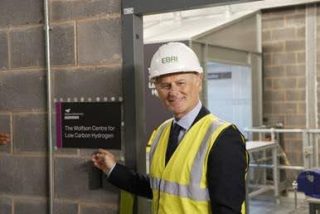-
Aston University opens UK’s first biomass-to-hydrogen research centre
Date posted:
-
-
-
Post Author
Greg Kelsall
-
-
![]()
Aston University has officially opened the Wolfson Centre for Low Carbon Hydrogen, the UK’s first fully integrated facility dedicated to converting biomass into low-carbon hydrogen and electricity under real-world industrial conditions. The new centre cost around £1.5 million (€1.8 million) to build, including a £300k grant from the Wolfson Foundation.
Based within Aston’s Energy and Bioproducts Research Institute (EBRI), it provides a complete system that converts biomass feedstocks into hydrogen and power, designed to accelerate the UK’s transition towards a net-zero future.
The facility’s pilot plant integrates three main technologies:- high-pressure gasifier that converts biomass into a hydrogen-rich gas;
- palladium membrane reactor that separates hydrogen of over 99.5% purity; and
- solid oxide fuel cell that converts the hydrogen into electricity.
Burning the hydrogen to produce electricity in a conventional engine would have a conversion efficiency of 25-35%. The fuel cell at the Wolfson Centre, however, has a conversion efficiency of up to 85%.
The Wolfson Centre for Low Carbon Hydrogen is unique for several reasons. Firstly, all three core facilities are in the same space which makes it easy to run the system as a whole, though the modular components can also be run separately for individual research. Additionally, the gasification process can operate at pressures used in industry, which most pilot plants used for research cannot achieve. Processes can behave very differently depending on the conditions, so being able to run the equipment at real-world pressures will give more accurate results. If an industrial company wants to carry out quick studies for changes in feedstock, catalyst or other parameters, the equipment at the Wolfson Centre will be able to facilitate this.
The researchers at the Centre believe that the future for the biomass and hydrogen industry will be in the ability to run the entire process, from biomass to electricity, at the same pressure, which will save energy and increase the overall efficiency. Currently, each stage requires re-pressurisation. The new facility will enable the team to test how operating the whole system without any drops in pressure will work.At the recent launch, Aston’s Vice-Chancellor Professor Aleks Subic described the Wolfson Centre as “a collaborative research hub, bringing together academics, industry partners, policymakers, and students to help shape the future of low-carbon energy.”

